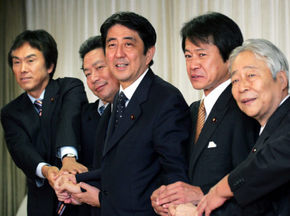 |
Seoul’s Foreign Affairs and Trade Minister Ban Ki-moon has stressed the need for the "Japanese political leader’s accurate awareness of history," but said that "we are entering [the Abe era] with an open mind." The South Korean presidential office maintained its existing position that it "has not set up a policy" regarding relations with Japan. A high-ranking Blue House official, who asked to remain anonymous, mentioned the necessity to improve Seoul-Tokyo relations, but said, "The important thing is that we can’t see any indications that the pending problems...will be resolved." Indeed, though the government seems to have no official position over Japan’s stance, sore issues linger between the two countries, including Japanese officials’ visits to the Yasukuni Shrine, where Class A war criminals are honored, and a whitewashing of history in certain Japanese history textbooks. A core official at the presidential office, also asking not to be named, said, "The government’s position is not that ’before Japan takes a certain measure, we won’t accept a summit.’ However, in light of public sentiment, some very sensitive issues exist between the two countries." Meanwhile, China and Japan recently discussed improving their relations in meetings held in Tokyo and Beijing. Japan suggested the resumption of the meetings during the APEC summit, but China has yet to accept the offer. Quoting sources familiar to the two nations’ relationship, The Asahi Shimbun reported, "If Abe doesn’t take a positive role [in repairing relations], [China] won’t make any moves."






